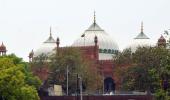In a breather to about 17 lakh madrasa students, the Supreme Court on Friday stayed an order of the Allahabad high court that scrapped the Uttar Pradesh Board of Madarsa Education Act, 2004 calling it "unconstitutional" and violative of the principle of secularism.

Observing that the issues raised in the petitions merit closer reflection, a three-judge bench headed by Chief Justice D Y Chandrachud issued notices to the Centre, the Uttar Pradesh government and others on the pleas against the high court order.
"The object and purpose of the madrasa board is regulatory in nature and the Allahabad HC is not prima facie correct that establishment of the board will breach secularism," the bench, also comprising Justices J B Pardiwala and Manoj Misra, said.
The top court said the high court "prima facie" misconstrued the provisions of the Madarsa Act, which does not provide for any religious instruction.
"The finding of the high court that the very establishment of the board would violate secularism appears to conflate madrasa education with the regulatory powers of the board.
"If the concern was to ensure that the students of madrasas receive quality education, the remedy would not lie in striking down the Madarsa Act but in issuing suitable directions to ensure that the students are not deprived of quality education," the bench said.
The apex court said the high court, while striking down the provisions of the Madarsa Act, directed relocation of the students.
"This would affect 17 lakh students....we are of the view that direction of relocation of students to other schools was not warranted," it said.
"State shall file counter on or before June 30, 2024. SLP be listed for final disposal in 2nd week of June 2024. The impugned order and judgment of the high court dated March 22, 2024, shall remain stayed," the bench ordered.
At the outset, senior advocate Abhishek Singhvi, appearing for the Managers Association Madaris, a body of madrasas, submitted that the madrasa regime, which had existed for 120 years, has now been disrupted suddenly, impacting 17 lakh students and 10,000 teachers.
Terming the reasons given by the high court as "astonishing", Singhvi said it did not examine the locus standi of the petitioner who challenged the Act.
Refuting the high court's contention that modern subjects were not taught in madrasas, Singhvi submitted that Maths, Science, Hindi, English and other subjects were taught there. He said it was wrong to assume that only religious education was imparted at madrasas.
"We also have very famous gurukuls in Haridwar and Rishikesh which are doing very good work. My father had a degree from there. Do you shut them down saying they are places of religious instruction?
"A regime is there uninterrupted for 120 years. 17 lakh students and 10,000 teachers cannot be absorbed with the academic year ending as it would create chaos," Singhvi said.
Additional Solicitor General K M Nataraj, appearing for Uttar Pradesh, submitted that the state government defended the Act but has accepted the high court's judgment which struck down the law.
"When the State accepts the judgment, the State cannot be burdened to bear the expenses of the legislation now. The State is competent to repeal the legislation as well. If the matter requires consideration, then I am not coming in the way," Nataraj said, adding that no madrasa is being shut down by the government.
Nataraj said the UP government bears a financial burden of Rs 1,096 crore every year in aid to madrasas.
Attorney General K Venkataramani said the high court's judgment does not have the impact of paralysing the madrasas and the only consequence would be that there won't be any State aid for them.
"In the facts presented before the high court, I could not persuade myself to say that the high court order was incorrect. We are on the entanglement of religion. Any entanglement of religion is the question here," he added.
The top court has posted the petitions for hearing in the second week of July.
The high court had on March 22 declared the Uttar Pradesh Board of Madarsa Education Act, 2004, "unconstitutional" and violative of the principle of secularism, and asked the state government to accommodate students in the formal schooling system.
The high court had declared the law ultra vires on a writ petition filed by advocate Anshuman Singh Rathore.
It had said the State has "no power to create a board for religious education or to establish a board for school education only for a particular religion and philosophy associated with it."
"We hold that the Madarsa Act, 2004, is violative of the principle of secularism, which is a part of the basic structure of the Constitution of India," the high court had said.
The petitioner had challenged the constitutionality of the UP Madarsa Board as well as objected to the management of madrasas by the minority welfare department instead of the education department.











 © 2025
© 2025